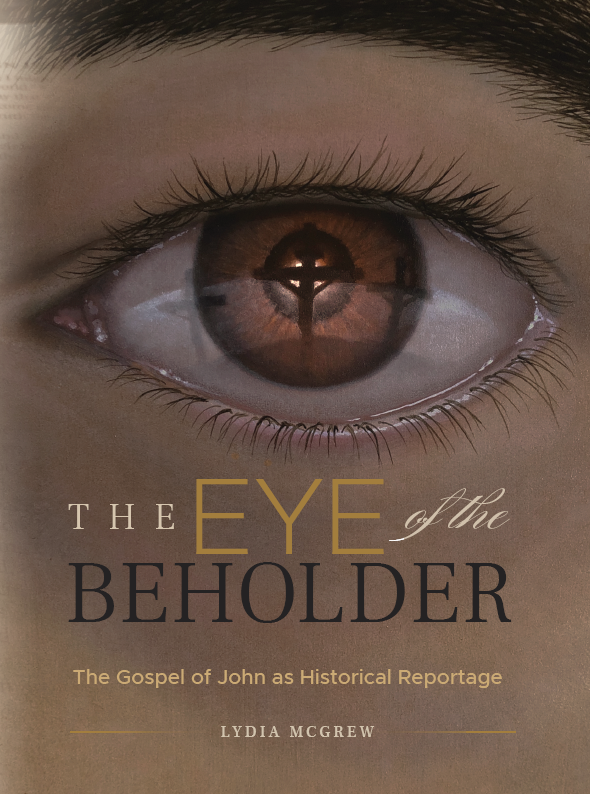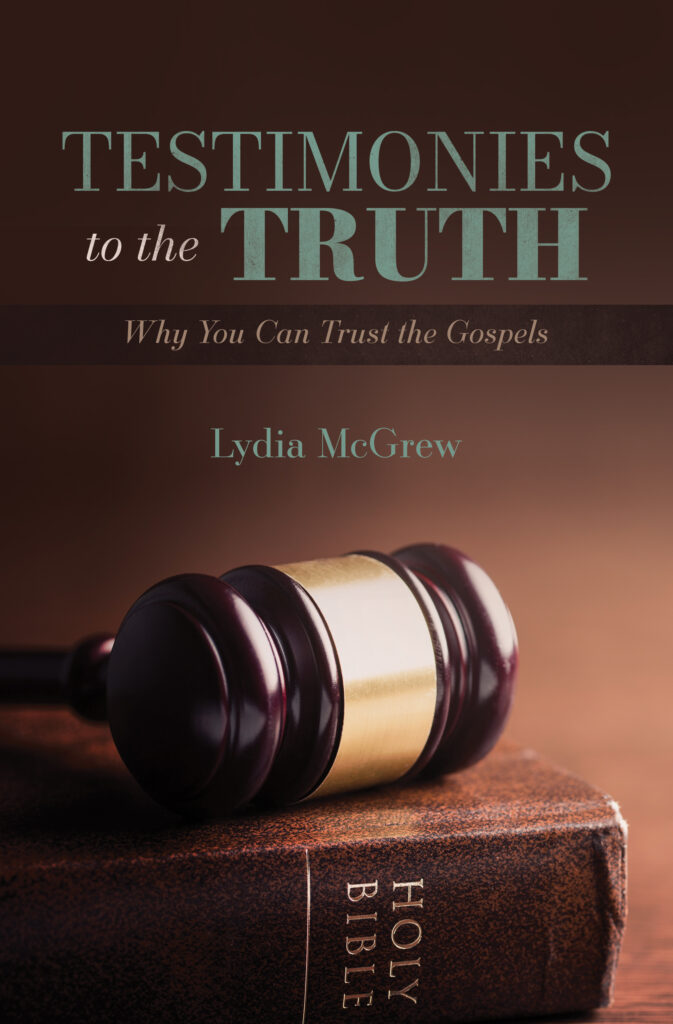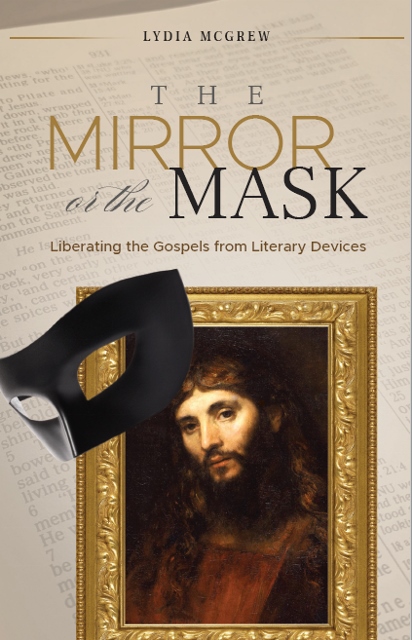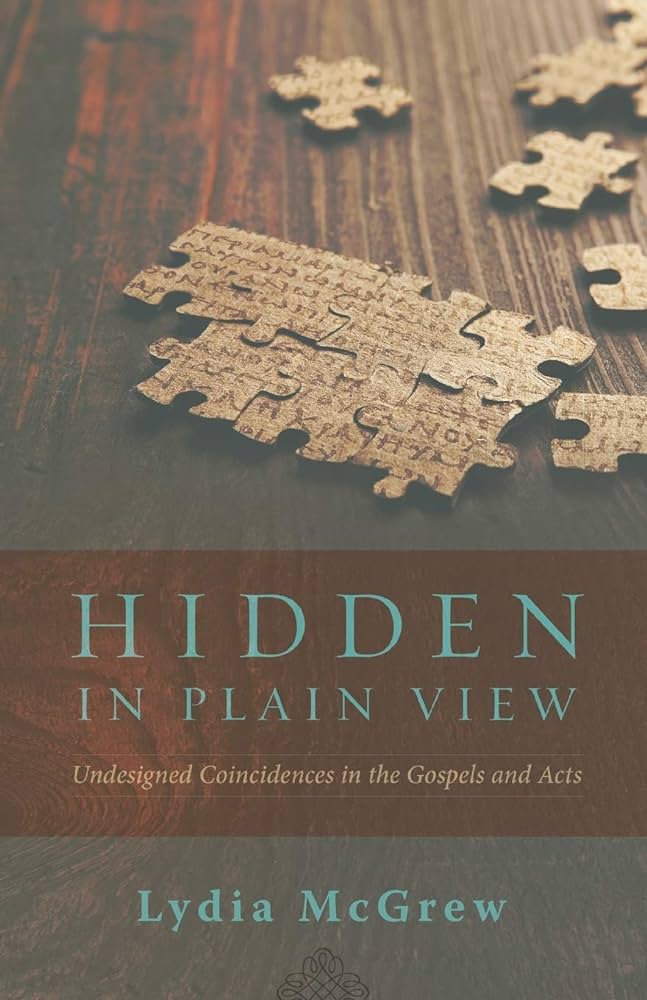I’m Lydia McGrew. I’m a Christian analytic philosopher doing work in both theory of knowledge and New Testament studies. My motto as a scholar is “Making common sense rigorous.”
See curriculum vitaeAbout the book:
Christians should be prepared to defend and share their faith, even while wrestling with doubts and questions that arise from within and without. With thousands of books out there-not to mention content on social media-where do we start? Testimonies to the Truth, my fourth book on New Testament reliability, provides a great starting point. I bring together new arguments and old ones in a form that is readily accessible to laymen while being careful and rigorous. With these arguments in hand, you will never be stumped when someone asks, “Why should I believe what the Bible says about the life and teachings of Jesus?” Above all, I point to Jesus himself, true God and true man, the One who teaches, loves, and suffers for us, described by the Gospels in vivid and credible detail. Including suggested study and discussion questions and references for further reading and research, this book is an excellent resource for personal study, Sunday School, high school and college classes, and small groups.
About me:
I am a widely published analytic philosopher, author, and the wife of philosopher and apologist Timothy McGrew. I received my PhD in English from Vanderbilt University in 1995. I have published extensively in the theory of knowledge, specializing in formal epistemology and in its application to the evaluation of testimony and to the philosophy of religion. I defend the reliability of the Gospels and Acts in my books Hidden in Plain View: Undesigned Coincidences in the Gospels and Acts, The Mirror or the Mask: Liberating the Gospels From Literary Devices, The Eye of the Beholder: The Gospel of John as Historical Reportage, and Testimonies to the Truth: Why You Can Trust the Gospels. More about me.
Endorsements:
This is McGrew’s best book to date! … McGrew dips back into nineteenth-century observations long forgotten, stirs in better-known recent ones and adds a few of her own discoveries for flavor. Craig L. Blomberg
Lydia McGrew offers a fresh and powerful case for the reliability of the Gospels. Resurrecting some classic arguments and yet offering some unique insights, Testimonies to the Truth deserves to be read by skeptics and believers alike. This is one of the top books I will now be recommending on why the Gospels can be trusted. Sean McDowell
Absolutely fascinating! … Discovering these insights will help you savor the Gospels in a whole new way. Natasha Crain
Lydia McGrew has again written a very helpful and insightful book … Both confirmed believers and those with questions will find this book of great benefit. Stanley Porter
PurchaseStay connected on social.
I try to upload new content to my YouTube channel each week, mostly related to Gospel reliability, philosophy of religion, and Christianity. Be sure to subscribe and tap the bell for updates!
Or, if you prefer to listen on the go, subscribe to my podcast on Spotify or Apple. This is content from November, 2024, to the present. Thanks to Erik Manning of Testify channel for regularly porting over audio from Youtube.
For audio content prior to November, 2024, go to this Spotify page or this Apple podcast page. (There was a technical glitch in late 2024 that required us to have two pages, one for content up to November and one for content after. Both of those now exist on both Spotify and Apple.)
Be sure to follow me on Facebook. There I curate a collection of engaging content centered around my published works, thought-provoking discussions on apologetics, philosophical musings, insights into the New Testament, and my perspectives on various noteworthy topics that I’m passionate about sharing with the public. (You do not have to be a Facebook “friend” to follow my public content.)
You can also visit and click ‘follow’ on my Amazon author page to access all my available books for order or download on Kindle.

Why is the Gospel of John different from Matthew, Mark, and Luke? Many scholars have suggested that John felt more free than the other evangelists to massage the facts in the service of his theological goals and to put embellishments into the mouth of Jesus. Such freedom supposedly accounts for the discourses in John, for Jesus’ way of speaking in John, and for (at least) the time, place, and manner of various incidents. In this book, I refute these claims, arguing in detail that John never invents material and that he is robustly reliable and honestly historical.
View Book Trailer
Endorsements:
McGrew makes a strong case for what she calls “historical reportage” as a means of reading and understanding John’s Gospel as a reliable and trustworthy account of the life, ministry, and teachings of Jesus. McGrew’s opponents dare not dismiss this set of arguments. Stanley Porter
Lydia McGrew shows how strong a case can be mounted for the entire Gospel as “historical reportage” when one does not begin with certain commonly asserted but unproven and implausible scholarly hypotheses about John’s composition. Craig L. Blomberg
The idea that the Gospel of John represents both profound theology and genuine history isn’t fashionable today, but McGrew demonstrates, with a battery of arguments and incisive reasoning, that the entirety of the Fourth Gospel is faithful to history. John as an eyewitness reports accurately what Jesus said and did. Thomas R. Schreiner
Lydia McGrew builds a robust case for seeing the Fourth Gospel as a self-standing apostolic memory of Jesus and his ministry, worthy of full consideration alongside the Synoptics as a lens through which to view more clearly the Jesus of history as well as the Christ of faith. In this philosophic critique of Gospel ahistoricity, the author forces critical scholars to doubt their doubts as well as default alternatives to traditional views. A worthy contribution to the field. Paul N. Anderson
PurchaseAbout the book:
In recent years, a number of evangelical scholars have claimed that the Gospel authors felt free to present events in one way even though they knew that the reality was different. Drawing on my training in the evaluation of evidence, I investigate these theories about the evangelists’ literary standards in detail and find them lacking. Simultaneously, I offer a nuanced, positive view of the Gospels that I term the reportage model. Dispelling misconceptions about this model, I gather objective evidence that the evangelists are honest, meticulous reporters who depict events truthfully.
My series of responses to Dr. Michael Licona
Endorsement:
“In recent years some evangelical scholars have claimed that the Gospel writers were allowed by contemporary literary conventions to present events one way even when the historical reality was different. This involves a number of distinct claims about writing conventions, each of which requires individual investigation. McGrew has done her homework and systematically considers the evidence for each convention, ultimately finding them all wanting. At the same time she amasses evidence that the gospels should be read in a way lay readers are likely to read them anyway. I am grateful for her knowledgeable contributions to Gospel studies.”
Peter J. Williams Principal, Tyndale House, Cambridge
About the book:
Hidden in Plain View: Undesigned Coincidences in the Gospels and Acts revives an argument for the historical reliability of the New Testament that has been largely neglected for more than a hundred years. An undesigned coincidence is an apparently casual, yet puzzle-like “fit” between two or more texts, and its best explanation is that the authors knew the truth about the events they describe or allude to. Connections of this kind among passages in the Gospels, as well as between Acts and the Pauline epistles, give us reason to believe that these documents came from honest eyewitness sources, people “in the know” about the events they relate.
2023 YouTube Series on Undesigned Coincidences
Endorsement:
“In this engaging book, Dr. McGrew shows that the Gospels and Acts are worthy of our confidence in their historical reliability. In case after case, she demonstrates that these accounts display features of actual testimony—especially the way the sources, whose authors surely did not collude, nevertheless complement one another. Dr. McGrew explains that she has not pioneered this line of argument but has reinstated it from 18th-century and 19th-century worthies. She has done more than that, however: with a combination of disciplined imagination and clear thinking, she has brought freshness and vigor to the discussion….”
C. John Collins, Professor of Old Testament, Covenant Theological Seminary
Informal Material
This blog contains a potpourri of content that goes back for more than a decade–Christian reflections, hymn discussions, apologetics, politics, and more. Check out the evidentialism, New Testament, apologetics, etc. tags on the left sidebar. An archival project has been completed at Extra Thoughts to try to store all of my biblical studies and apologetics content from What’s Wrong With the World. Old posts that are reposted from What’s Wrong With the World are labeled as such.
I am chiefly using Facebook (author page is here) for updates now. Remember, you do not have to be my Facebook “friend” to follow my public content.
What’s Wrong With the World (Archival version)
This was my group blog for many years. It is now in archival form.
Here are my New Testament posts at What’s Wrong With the World
Here is a playlist of long-form webinars that Tim McGrew and I have done for Apologetics Academy over the years, hosted by Jonathan McLatchie.
Site last updated 5/6/25
Thanks to Erik Manning for help setting up and maintaining this site.


